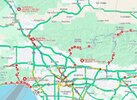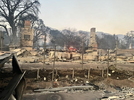You are using an out of date browser. It may not display this or other websites correctly.
You should upgrade or use an alternative browser.
You should upgrade or use an alternative browser.
CA Fires ...
- Thread starter Mellow
- Start date
The pictures are horrific. The devastation that wildfires can cause is a sober reminder that we aren't the complete masters of our universe as we like to think. Hopefully everyone gets out safely.
bdalameda
PaleoCyclist
I know a lot of people down in that area as our company has several facilities near there. My boss just flew down in the company jet and picked up some of our people to get them out of there.
Last count (just watching LA News) there are four different fires. The problems is that there is "Old Growth" and with those winds, the fires are spreading very fast.
In one area of the Palisades fire, they had to use a bulldozer to move abandon cars out of the way, so the fire fighters could get into one of the areas to fight the fires. It's a total mess!


According to the reports they had this morning, Fire Fighting resources are spread very thin. Also, because of the high winds, they are not able to get the aircraft in the air to fight the fire with.
Really hard to watch the TV, showing the housing burning up.
So far, they have had two people killed.
My prayers go out to all those involved!
All of these areas are places I rode around at one time or another.
In one area of the Palisades fire, they had to use a bulldozer to move abandon cars out of the way, so the fire fighters could get into one of the areas to fight the fires. It's a total mess!


According to the reports they had this morning, Fire Fighting resources are spread very thin. Also, because of the high winds, they are not able to get the aircraft in the air to fight the fire with.
Really hard to watch the TV, showing the housing burning up.
So far, they have had two people killed.
My prayers go out to all those involved!
All of these areas are places I rode around at one time or another.
Ohhhh how I hate news like this. Best wishes for good outcomes for all.
I remember reading a post from a couple years back, by a member whose property had been entirely consumed by a wildfire. All that remained of his ST1300 was a shapeless lump and a solidified puddle / trail of what had been molten aluminum. Utterly unrecognizable.
I remember reading a post from a couple years back, by a member whose property had been entirely consumed by a wildfire. All that remained of his ST1300 was a shapeless lump and a solidified puddle / trail of what had been molten aluminum. Utterly unrecognizable.
ChucksKLRST
Team Colorado
Wonder how many of California's fires are arson, human carelessness / stupidity, or weather related / lightning.
Does arcing electrical lines count as carelessness or stupidity?Wonder how many of California's fires are arson, human carelessness / stupidity, or weather related / lightning.
I think a large percentage of them are either outright arson, or stupidity like someone throwing a cigarette butt out of a car window.Wonder how many of California's fires are arson, human carelessness / stupidity, or weather related / lightning.
Lightning is very rare in soCal, so its quite a coincidence that every time we get high winds, we get fires spontaneously igniting. A few times they were attributed to high voltage power lines, but those are the small minority of cases.
in 2003 we had an idiot who got lost while hunting and decided to start a "signal fire" during a high wind event. I think he might be in jail, he was prosecuted as I recall. There aren't many trees to get lost in where he was at, so his entire story seemed a bit suspect.
the heat they generate is unimaginable unless you've had the experience to be near one. In the early '80s we had one get fairly close to the apartment complex I was living in, and they closed the freeway just down the road. So naturally a bunch of us had to go walk the freeway, beer in hand, and see what was going on. I can't recall the exact details, but I think we were probably about 1/2 mile away and the heat at that distance was equivalent to putting your head next to a campfire. We couldn't stand there for more than a few seconds before turning and running the opposite direction. That's why everything goes up in flames almost instantly, and gets burned to nearly nothing, the heat level is incredible when you have a wall of flames. FWIW, our freeways are quite wide, so we weren't afraid of the fire jumping over the freeway to get to the side we were on. It was windy, but not crazy windy like in some of these fires. Probably not the smartest thing to do during a fire, but I wouldn't have the story otherwise, life's a risk.I remember reading a post from a couple years back, by a member whose property had been entirely consumed by a wildfire. All that remained of his ST1300 was a shapeless lump and a solidified puddle / trail of what had been molten aluminum. Utterly unrecognizable.
ChucksKLRST
Team Colorado
That would be weather related unless the power company did not plan for and mitigate the risk of that happening, then it would fall under carelessness, possibly stupidity.Does arcing electrical lines count as carelessness or stupidity?
Sometimes lack of maintenance. From what I've read, some of the power lines are difficult to reach and I would guess tree trimming does not happen often enough.Does arcing electrical lines count as carelessness or stupidity?
ChucksKLRST
Team Colorado
I guess you could call that an Adventure.the heat they generate is unimaginable unless you've had the experience to be near one. In the early '80s we had one get fairly close to the apartment complex I was living in, and they closed the freeway just down the road. So naturally a bunch of us had to go walk the freeway, beer in hand, and see what was going on. I can't recall the exact details, but I think we were probably about 1/2 mile away and the heat at that distance was equivalent to putting your head next to a campfire. We couldn't stand there for more than a few seconds before turning and running the opposite direction. That's why everything goes up in flames almost instantly, and gets burned to nearly nothing, the heat level is incredible when you have a wall of flames. FWIW, our freeways are quite wide, so we weren't afraid of the fire jumping over the freeway to get to the side we were on. It was windy, but not crazy windy like in some of these fires. Probably not the smartest thing to do during a fire, but I wouldn't have the story otherwise, life's a risk.
in the southern part of the state there are very few natural trees other than in the mountainous areas, so nothing much to trim around our power lines. But we have lots of dry brush that ignites even easier than trees if the sparks fall to the ground. So, they've started a program where they will shut down the power in certain areas when the winds get high enough to avoid the problem altogether.Sometimes lack of maintenance. From what I've read, some of the power lines are difficult to reach and I would guess tree trimming does not happen often enough.
bdalameda
PaleoCyclist
I'll tell you it is an awful feeling when you have to evacuate. We had to a few years ago when our area was on fire. Seeing the ridge behind our home on fire with flames and embers shooting into the sky was quite an experience. We grabbed our dogs and little else and left. It was sickening not knowing if we were going to have anything left to come back to. Forest management is sadly lacking but in addition to that many areas have homes spread out now in a lot of these formerly remote areas with small roads and power lines routed through the trees and canyons.
From what I've read, its a systemic problem. People want to live in picturesque areas, and build houses in fire, flood, storm prone areas. Proper management of the area is difficult and expensive, and managed burns in populated areas can get out of hand. Utilities are ever aware of the bottom line and defer maintenance. And, at the first sign of a major catastrophe, the insurance companies read the fine print and escape clauses to get out from under expensive claims. Then they run like heck.Forest management is sadly lacking but in addition to that many areas have homes spread out now in a lot of these formerly remote areas with small roads and power lines routed through the trees and canyons.
We have met the enemy and he is us....
Had to defend a couple claims arising out of the use of ATV's in dry areas. The sparks from the exhaust would ignite and start fires.
From what I've read, its a systemic problem. People want to live in picturesque areas, and build houses in fire, flood, storm prone areas. Proper management of the area is difficult and expensive, and managed burns in populated areas can get out of hand. Utilities are ever aware of the bottom line and defer maintenance. And, at the first sign of a major catastrophe, the insurance companies read the fine print and escape clauses to get out from under expensive claims. Then they run like heck.
We have met the enemy and he is us....
This is one of the biggest problems in CA! Everyone wants BIG trees to shade their homes with and then plant a bunch of bushes around for privacy. But then they don't maintain their yards, and many of the towns in SoCal are surrounded by OLD GROWTH!
One of the reasons the forests in CA burn so often, is because they are not maintained and are full of old growth. Oh, just let Nature take care of it, and it does, by burning it down!
In Murrieta, we had a deep canyon about 1/4 of a mile from our home. That caught on fire (I can't remember the cause). Thank goodness the winds were not blowing towards our home, because there wouldn't have been anything to stop the fire from spreading. And that area was fairly new (less than 10 years old), but everyone plants trees and bushes and that just gives these fires fuel!
Our new home, here in Cedar City, that we've been here now for four years, and I have been very selective as to what is getting planted in this yard. There are many fields for miles, around us, along with two acre lots that people live on and are not well maintained. I could see a fire ripping through this area, just like SoCal. And yes, we have strong winds all the time through here. So I'm trying to keep the possibility of our home going up, by not having too many trees or bushes, in the yard.
Bob, this isn't a CA problem specifically. The forests in all the western states are mostly on federally owned land, called National Forests. They are all prone to wildfires, as we see every summer and fall, regardless of which state they're in. Forest maintenance costs a lot of money, and everyone knows Americans are averse to paying anything in extra taxes that won't directly benefit them, so who would fund that widespread maintenance over the entire western US anyway?One of the reasons the forests in CA burn so often, is because they are not maintained and are full of old growth. Oh, just let Nature take care of it, and it does, by burning it down!
Bmacleod
Site Supporter
My parents lived north of Payson, AZ for years in prime wildfire territory. My dad told me once that the state had a plan to come in and thin out the forests to reduce the fire risk. The plan was to sell the trees to wood processing plants. One was nearby that made wood pellets for stoves. The sale of the trees was to offset the cost of the thinning job. Apparently, the environmentalists stepped in and said that if they were giving the trees away, then they would support the plan, but if they were going to make one dollar from selling the trees, they would stop it. It seems that they figured once money was involved, corruption would take over and forests would be compromised. The forests never got thinned and the state burned every summer after 
Share:

